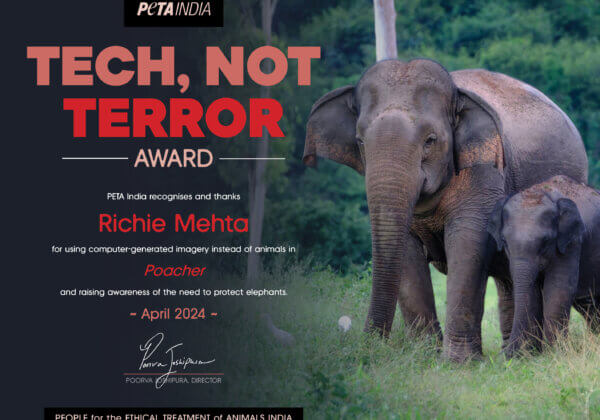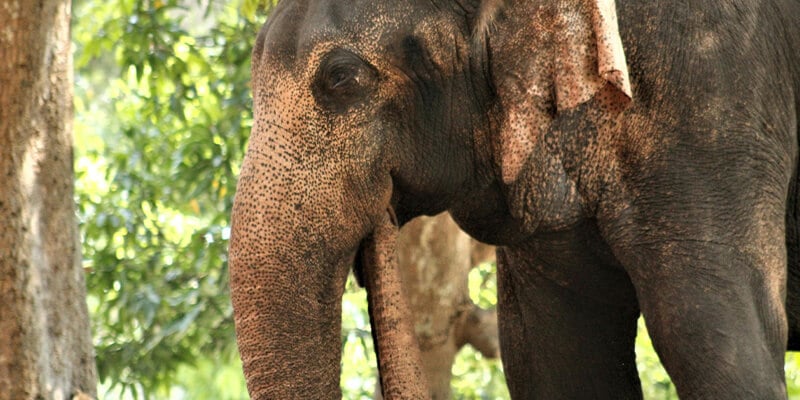Hearing PETA’s Plea, NGT Passes Interim Order Banning Manja
In response to PETA India’s petition calling for a nationwide ban on all forms of sharp kite-flying strings called manja, a bench headed by Justice Swatanter Kumar, Chair of the National Green Tribunal (NGT), passed an interim prohibitory order banning the procurement, stocking, sale and use of manja made of nylon thread which is also called Chinese dor or other sharp material, as well as synthetic or cotton thread coated with glass or other hazardous compounds until the next hearing, which is on 1st February 2017. The interim ban is expected to save many lives as it comes just a month before Makar Sankranti, a festival during which there are many bird and human deaths caused by manja.
PETA was represented by Senior Counsel Mr. Sanjay Hegde who demonstrated to the court that except the uncoated cotton threads traditionally known as saddi used in kite flying, all other sharp threads cause grievous injuries to humans and birds besides being non-biodegradable. PETA filed the petition in the NGT in August 2016, after which notices were issued to all state governments; the Ministry of Environment, Forests and Climate Change (MoEFCC); the Ministry of Home Affairs; the Ministry of Commerce and Industry; and the Ministry of Power seeking their responses to PETA’s call for a manja ban.
PETA warns in its petition that manja –which is either made from a sharp material or is coated with glass, metal, or other sharp objects – poses a lethal threat to humans and animals alike. This year on 15 August, three people –including two 3-year-olds– were killed in Delhi when their throats were slashed by manja. And recently, three people died when their throats were slashed by manja while riding motorbikes, including a man in Ghaziabad in July 2016, a man in East Delhi in August 2015, and a 5-year-old boy in Chennai who was riding with his father in 2015.
Thousands of birds are also killed every year when they are cut or trapped by manja, which can get caught on trees or buildings for weeks. Shri Digambar Jain LAL Mandir bird hospitalin Delhi treated 500 birds who were injured within just three days surrounding Independence Day celebrations. A bird rescuer in Ahmedabad estimates that 2,000 birds – including pigeons and endangered species such as vultures – are injured every year during the city’s Uttarayan festival, and 500 of them die from their injuries. According to estimates, more than 300 birds were injured and over 100 died because of manja during Makar Sankranti in Hyderabad in 2015.
PETA India’s petition also explains that manja causes expensive blackouts and electrocutes kite flyers. According to Delhi power company BSES, a single incident involving a kite near an electrical establishment can affect up to 10,000 customers. This year, Delhi power companies also reported that compared to the previous year, the number of power-tripping incidents on 15 August nearly doubled, from 18 to 33. Several top power companies, such as Reliance Power and Tata Power, have time and again issued advisories urging people not to fly kites near electrical establishments. Mukesh Patel was only 13 years old when he sustained burns over 95 per cent of his body after his kite hit a power line in Mumbai. Manja made of synthetic material such as nylon is also non-biodegradable, litters the soil, and chokes drainage lines, sewer systems, and natural waterways.
Citing the dangers it poses to humans, birds, and the environment, the High Courts of Allahabad, Jammu and Kashmir, and Rajasthan had previously issued directives banning the use of manja in their respective states. Many other states and district administrations – including Amritsar, Andhra Pradesh, Chennai, Cuttack, Gujarat, Indore, Karnataka, Madhya Pradesh, Maharashtra, and Telangana – had also previously taken steps to ban or restrict the production, sale, stocking, and use of manja.
The MoEFCC had also issued an advisory to all states and union territories asking them to address the manja threat, and the AWBI had previously written to all states and union territories urging them to ban it.
You Can Help:
Ask the government for a permanent countrywide ban on lethal manja:







